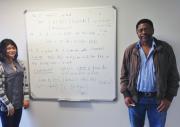The paper she began in May, during a residency in South Africa, first took shape a year earlier, in the Hammermill Building, where Papiya Bhattacharjee hosted three days of discussion about ordered algebraic structures.
Bhattacharjee, an assistant professor of mathematics at Penn State Behrend, is an expert in point-free topology. That’s the study of the properties that allow geometric figures to bend or stretch without breaking. It’s how computers are programmed to make decisions.
 Twenty mathematicians attended her 2013 conference. Among them was Thembe Dube, a professor at the University of South Africa. He, in turn, invited Bhattacharjee to visit his campus, which serves more than 350,000 students, most of whom study online. He provided an office, a coffeemaker – “Instant coffee is a very big thing in South Africa,” Bhattacharjee says – and the opportunity to further explore a subset of topology: “sober,” or closed-set spaces, which are irreducible and have unique generic points.
Twenty mathematicians attended her 2013 conference. Among them was Thembe Dube, a professor at the University of South Africa. He, in turn, invited Bhattacharjee to visit his campus, which serves more than 350,000 students, most of whom study online. He provided an office, a coffeemaker – “Instant coffee is a very big thing in South Africa,” Bhattacharjee says – and the opportunity to further explore a subset of topology: “sober,” or closed-set spaces, which are irreducible and have unique generic points.
Bhattacharjee accepted the four-week residency. She presented a seminar to the university’s students and faculty members. She enjoyed a safari tour of Kruger Park, where elephants, lions and white rhinos roam. But mostly she burrowed into abstract mathematics, proving theorems involving sober topological spaces and constructing examples and counter-examples to support the results.
She and Dube were a good match. In just two weeks, they had completed a paper, which they submitted to Bulletin Mathematique.
“I have never had a paper written that quickly,” Bhattacharjee says. “This one just clicked. I went there, we discovered the results and we put them on paper. It was such a nice collaboration.”
She had followed Dube’s work, as he did hers, in journals and at conferences. She had discussed topology with him in email exchanges. This was different. Sitting together, sipping coffee, they focused, finding sense in frames, lattices and other algebraic structures.
“It’s different, being in a room together,” Bhattacharjee says. “It’s more efficient. You can build on the work. You aren’t always putting it aside, waiting for an email reply.”
She embraced the approach, which allowed her to focus without interruption. “I’m that type of person,” she says. “I like to get things done.”
The collaboration has led to other opportunities. Bhattacharjee was asked to review submissions for a South African mathematics journal. She and Dube are pursuing grant funding for additional research.
They are, for now, communicating mostly via email. Bhattacharjee hopes to have another chance for face-to-face collaboration: The annual conference on Order, Algebra and Logic will return to Penn State Behrend in 2016, and Dube has said he will attend.
